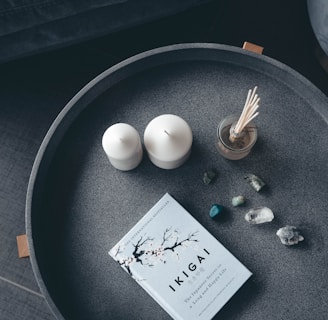What is Ikigai?
Where does Ikigai come from and what does it mean? How can you find your Ikigai? Why do we use Ikigai in our Career Coaching programs?
Laetitia Kunz
1/3/20244 min read


Where does Ikigai come from and what does it mean?
The Ikigai concept comes from Japan and the word "Ikigai" could be translated as "a life worth living" or "a reason for being or for waking up in the morning". It is centred around living a more meaningful and fulfilling life.
In Japan, Ikigai is a way of living and thinking which provides a deeper level of connection with us, others, and our world. It is not about the goal, but about the process. It focuses on feeling satisfied, fulfilled, less stressed and more conscious. For example: finding satisfaction in repeating the same gestures or techniques every day; like traditional Sushi's Masters do, is Ikigai. It is finding satisfaction in the process of creating something.
In the Western world it is often used as a personal development, human resources, and career coaching tool. It is simplified as the intersection between 4 elements:
• what you love = your passion
• what you are good at = your mission
• what the world needs = your vocation
• what you can be paid for = your profession
Marc Winn's diagram (here below) is commonly used to show that Ikigai is the sweet spot where your passion, mission, vocation and profession converge together.


There are concepts and philosophies like Ikigai in other parts of the world:
• Logotherapy: finding meaning in life, particularly through finding one's purpose or mission (by Viktor Frankl).
• Hygge: coziness, comfort, and enjoying simple pleasures in life, fostering well-being and contentment (a Danish concept).
• Eudaimonia: human flourishing and well-being, emphasizing living in accordance with one's true nature and virtues (a Greek concept).
• Dharma: one's duty, moral and ethical responsibilities, and living a righteous life aligned with universal laws (in Hinduism, Buddhism, and Jainism).
• Flow: a mental state of complete immersion and enjoyment in an activity, where skills and challenges are balanced (by Mihaly Csikszentmihalyi).
• Ubuntu: interconnectedness, community, and the belief that a person is a person through other people (an African philosophy).
They all share the following traits: seeking purpose, fulfilment, and a deeper understanding of life's meaning and satisfaction.
How to find your Ikigai?
We all have an Ikigai!
People who found their Ikigai or live an Ikigai life, are usually more present, focusing on one task at a time, socialising and participating in their community, exercising, having healthy eating and drinking habits, spending time in nature or gardening, finding satisfaction in everyday tasks and practicing daily something they are passionate about. Ikigai does not always involve being paid, bringing something needed to the world or being highly qualified.
As we and our society change, our Ikigai changes too. Our passions, interests, what makes us feel happy, how our world works may differ from one period of our life to another.
For some of us, our Ikigai might be obvious. It could be activities we are very good at, we engage in daily and which make us feel a bit challenged (for example: arts and crafts, sports, music, cooking, engineering).
For others it might require a deeper introspection to find it.
Here is a little exercise to get you started with what makes you sparkle and what you are the best at.
A simple exercise to help you find your Ikigai
What you like doing:
List everything you like doing at home, at work, during weekends or holidays, and when you were a kid.
For each of them explain and analyse why you like doing them.
What you are good at:
On another page list all your qualities, talents, competences from when you were a kid till now. Fill in the whole page, don't limit yourself to just a few words. Think about how others would answer, you can also directly ask them (colleagues, friends, teachers, boss, family).
Select 3 qualities in your list. The ones which resonate the most with your heart and who you deeply are. Meditate on these 3 qualities, observe and note what comes up.
If you would like to go deeper into applying the Ikigai concept to your professional life, get in touch with your Ikigai Mentor.
Why do we use Ikigai in our career coaching programs?
Having made numerous visits to Japan and having lived in Asia, our aim was to incorporate some of its profound wisdom into our programs. This was prompted by our realization that we often prioritize the end goals rather than valuing and appreciating the journey or process itself.
We have seen in the first part of this article that Ikigai is about practicing daily what we are passionate about and finding satisfaction in the process. In our current societies we tend to spend a lot of time at work, focusing on our objectives for the day, the month, the quarter, or the year.
But, do we enjoy the process which leads to reaching our professional objectives?
Feeling fulfilled at work, in what we do (almost) every day; helps feeling more satisfied, less stressed and getting closer to a more meaningful life (it is Ikigai).
It does not mean we have to live from our passion or that everything we do is exciting. Not all tasks are pleasant, some of them bring us more comfort, satisfaction, challenges than others. It's about finding the right balance between what we like, what we are good at and what we can be paid for. It involves getting a deep understanding of who we are, what we want in life and what challenges us enough to keep us interested.
In the complex and competitive world, we live in, it's not always easy to find its own path and to live from an activity we like and are good at. After spending 12+ years in Talent Acquisition, being in touch with people from various backgrounds, origins, cultures; I realised finding a satisfying job is a process in which we are often left alone. That's why I created "Ikigai Mentor".
We built Career Coaching programs to assist people in discovering what brings them satisfaction and in exploring ways to apply it to our current world. Not just filling up some tests or a diagram but really building a fulfilling career plan based on what makes you feel good, your competences or talents and the market you are in. There are too many people feeling unhappy about their jobs and it damages the other aspects of their life (family, friendships, mental and physical health). We believe careers should not be boring or a burden. A satisfying job can only bring us closer to a happier life!
Do you feel the need for some support in finding a satisfying role or career? We are here for you!
